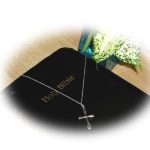↓Audio link to the full sermon
Today’s message is from Mark 14:24, “This is my blood of the covenant.”
In verse 3, a woman came with very expensive perfume. It says, “A woman came with an alabaster jar of very expensive perfume, made of pure nard. She broke the jar and poured the perfume on his head.” The act of pouring perfume oil on someone’s head is the act of a priest or king being appointed. This woman’s act revealed that she believed Jesus was the king, and it was understood by Jesus as her gratitude and appreciation.
John 12:3 says, “Then Mary took about a pint of pure nard, an expensive perfume; she poured it on Jesus’ feet and wiped his feet with her hair. And the house was filled with the fragrance of the perfume.” Here, it says that she poured it on the feet, but whether it is the head or the feet, Mark and John simply had a different point of view to emphasize.
John recorded in chapter 11 that Lazarus rose from the dead. As one of Lazarus’ sisters was Mary, it turns out that this woman’s gratitude for Jesus was behind the expensive perfume. When Mary was mourning, she said to Jesus, “Lord, if you had been here, my brother would not have died”(John 11:32). As Jesus saw Mary mourning, Jesus wept. Understanding Mary’s heart, Jesus raised Lazarus from the dead. As Mary experienced the power and kindness of Jesus, she tried to express her gratitude for Jesus with this anointing. And as she wiped Jesus’ feet with her hair, her gratitude and her desire to spend the rest of her time with Jesus is shown here. We have so many things to learn from her devoted faith.
On the other hand, Judas Iscariot saw this and said indignantly, along with other disciples, “Why this waste of perfume? It could have been sold for more than a year’s wages and the money given to the poor.” And they rebuked her harshly. Three hundred denarii was worth one year’s wages at that time.
Those who are enslaved by money cannot bear to waste such an amount. When I think about this amount of money, I understand the reason why they criticized this woman. However, Jesus said, “Leave her alone. Why are you bothering her? She has done a beautiful thing to me. She did what she could. She poured perfume on my body beforehand to prepare for my burial” (Mark 14:6-8).
Jesus mentioned his burial, and it reminds us that He repeatedly told his disciples that he was about to die on the cross and rise on the third day. This is because Jesus’ mission was to be put on the cross to complete the redemption of human beings.
When we read verses 10-11, we can see that Judas was controlled by money, so he went to the chief priest to betray Jesus. “They were delighted to hear this and promised to give him money. So he watched for an opportunity to hand him over.” The motive for Judas’ betrayal of Jesus seemed to be a desire for money (see Matthew 26:15). Other than that, Judas had the expectation of a political messiah, which was not fulfilled. But also, we can’t forget that he couldn’t resist the temptation of Satan (see John 13:2, 27).
From verse 12, the events of the Last Supper are recorded. In verse 16, the supper was described as a Passover meal. Let’s see what kind of festival the Passover was.
The background of Passover is written in the book of Exodus. God sent Moses and Aaron to the king of Egypt to ask for the release of Israelites who had been enslaved in Egypt. God struck Egypt with nine plagues, yet he didn’t let go of the Israelites, so the tenth plague came to Pharaoh. It was the death of the first child caused by a supernatural force. At the same time, these plagues were a time of salvation and liberation for the Israelites. For more information, please read Exodus chapter 12. But here is the gist of it:
The Passover is one of the three major festivals in Israel. The Lord had ordered this event to be celebrated as a festival so Israelites would never forget their identity. It is a festival that reminds them that they have been released and saved by the sacrifice of the blood of the lamb. Bread without yeast represents life without sin, and eating it with bitter herbs symbolizes how bitter and painful sin can be in our lives.
Jeremiah 31:31 says, “’The days are coming,’ declares the Lord, ‘when I will make a new covenant with the people of Israel and with the people of Judah.’” This was a prophecy that the era of the New Testament was to fulfil. The new covenant began when Jesus died on the cross, taking all the sins of mankind. Jesus, the son of God, had his body broken on the cross and his blood was shed, and that was how the sins of mankind were redeemed. For those who believe in it, the forgiveness of their sin and eternal life are given to them. Jeremiah spoke of a new covenant which was made by faith, not by good deeds.
To make this clear, Jesus took the first Communion with his disciples at the Last Supper. Mark 14:22-24 says, “While they were eating, Jesus took bread, and when he had given thanks, he broke it and gave it to his disciples, saying, ‘Take it; this is my body.’ Then he took a cup, and when he had given thanks, he gave it to them, and they all drank from it. ‘This is my blood of the covenant, which is poured out for many,’ he said to them.” It is interesting that the first Communion was held during Jesus’ very last meal with his disciples.
Whenever we have Communion, let us remember the cross of Jesus and be thankful for the salvation Jesus has brought by sacrificing his life for us.





